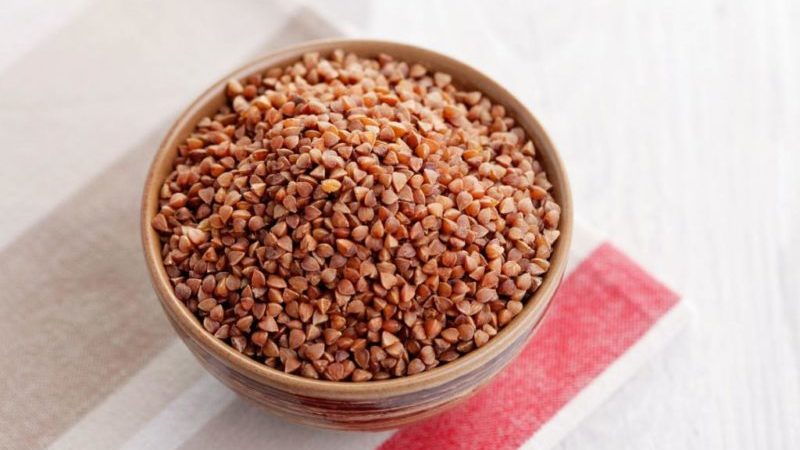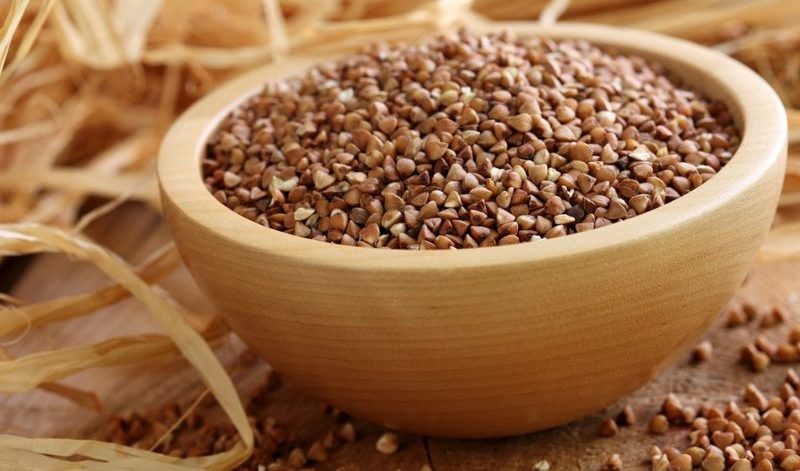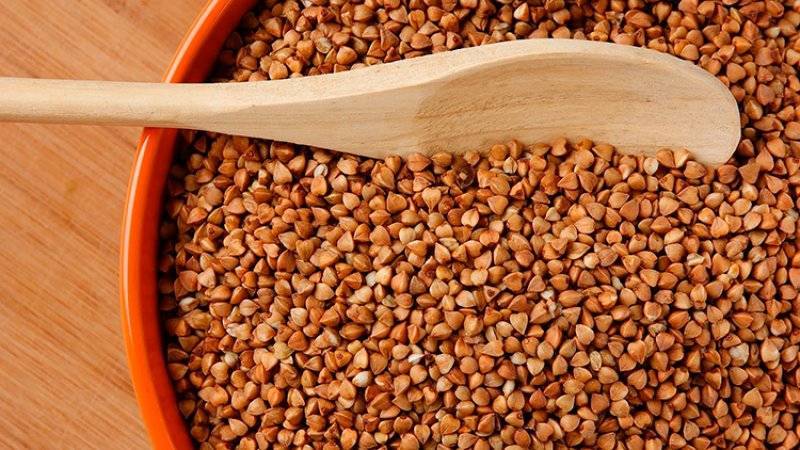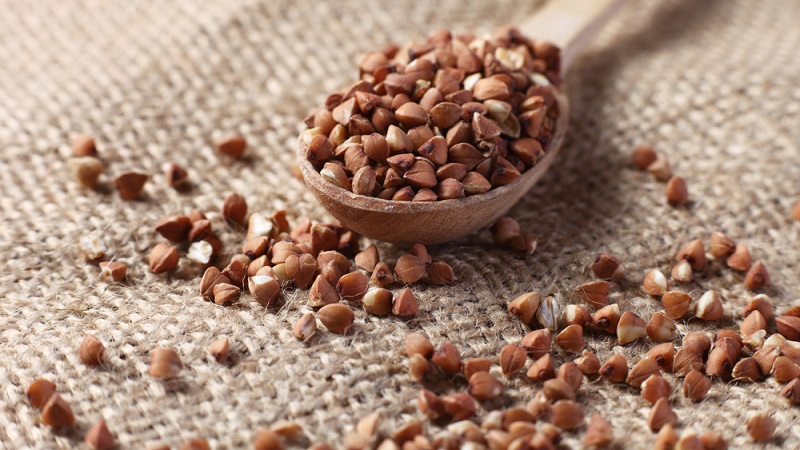Is raw buckwheat useful and can it be eaten like this?
Buckwheat is one of the best dietary products, rich in protein, vitamins and other nutrients. There are many recipes for its preparation, and according to some information sources, buckwheat can be eaten raw. We'll tell you if this is true and how useful it is.
The content of the article
- Chemical composition, nutritional value, vitamins and macronutrients of raw buckwheat
- Is it possible to eat buckwheat raw and how to do it
- The benefits of raw buckwheat for the human body
- Possible harm and contraindications
- What happens if you regularly eat dry buckwheat
- The opinion of nutritionists
- Conclusion
Chemical composition, nutritional value, vitamins and macronutrients of raw buckwheat
The chemical composition of buckwheat is rich in proteins, as well as slow carbohydrates, which provide a feeling of fullness for a long time. The cereal contains little fat. This makes it an excellent dietary product.
For 100 grams of cereals, there are:
- 12.6 g of proteins;
- 3.3 g of fat, of which 0.6 g of saturated fatty acids and 2.29 g of unsaturated ones;
- 61 g of carbohydrates, of which 55.4 g of starch and 1.4 g of di- and monosaccharides;
- 11.4 g of dietary fiber.
The nutritional value: 308 kcal per 100 g.

From vitamins and macronutrients buckwheat contains:
- A and beta-carotene are good for skin and hair;
- B1, B2, B6, B9 have a beneficial effect on the functioning of the nervous system, the condition of the skin, nails and hair;
- C is beneficial for blood vessels, immunity, skin condition;
- E has a positive effect on the skin;
- PP is useful for digestion and the cardiovascular system;
- potassium, calcium, magnesium, sodium, phosphorus, iron, iodine, zinc and sulfur.
Is it possible to eat buckwheat raw and how to do it
With the usual methods of cooking, cereals lose some of the nutrients, so some people eat it raw. But raw doesn't mean dry. Raw is uncooked, but still cooked cereal.
Important! Dry buckwheat is not suitable for human consumption.
There are two ways to cook buckwheat without heat treatment - with kefir and with water:
- On kefir. Rinse with 2 tbsp. l. cereals in cold water, pour 200 ml of kefir, leave in the refrigerator overnight. Consume in the morning on an empty stomach.
- On the water. Add 200 ml of clean water at room temperature to 100 g of cereals and leave overnight. Consume at any time.
The benefits of raw buckwheat for the human body

Soaked buckwheat retains a maximum of useful properties and has a beneficial effect on the human body. Namely:
- Promotes the removal of toxins and toxins, reduces the burden on the liver. This makes it much easier for the body to lose weight and not gain it again.
- Replenishes the lack of protein and, as a result, eliminates muscle weakness, low performance and endurance. This property is most important for people who choose vegetarianism.
- Favorably affects the work of the gastrointestinal tract. This is facilitated by the content of starch and fiber in buckwheat, which help to cope with constipation and flatulence.
- Being an effective dietary product, buckwheat promotes losing weight in the process of dieting.
- Reduces blood sugar due to its low glycemic index. This property is important for those with diabetes.
- Reduces the risk of gallstones.
- It can normalize blood pressure thanks to polyunsaturated fatty acids.
- Due to magnesium, it helps fight swelling of the extremities and reduces the risk of developing varicose veins.
- Replenishes iron deficiency.
- Strengthens blood vessels and improves blood clotting.
- It has a beneficial effect on the nervous system, the condition of the skin, hair, nails and teeth (B vitamins).
- Helps maintain visual acuity.
From the above properties, it follows that buckwheat is especially useful for vegetarians, diabetics, anemic patients, people prone to heart attacks and strokes, who want to lose weight.
Important! Buckwheat mono-diets contribute to gaining even more weight after losing weight. To avoid such unpleasant consequences, you just need to make cereals a permanent product in the diet.
Possible harm and contraindications
Even the most useful product can be harmful in some cases, and buckwheat is no exception.
Very steeply cooked porridge can cause harm. It will lead to constipation, especially in pregnant, or gassing.
Buckwheat is contraindicated:
- people with increased blood clotting due to a large amount of routine;
- people with stomach ulcers, gastritis and similar diseases of the gastrointestinal tract.
People with varicose veins and kidney failure should be careful about using buckwheat and it is better to consult a doctor.
What happens if you regularly eat dry buckwheat

If you eat a little dry buckwheat and wash it down with water, nothing will happen. But eating a lot of dry cereal can cause digestive problems such as bloating, pain, and inflammation. And if you do it regularly, you can get gastritis or its exacerbation. That is why raw buckwheat must be soaked in water or kefir.
The opinion of nutritionists
Many nutritionists talk about the benefits of buckwheat, but their opinions differ somewhat.
Nutritionist Ekaterina, Moscow: “The buckwheat diet, like any other mono-diet, is more likely to harm the body, because it is unbalanced. It is impossible to abuse even such a useful product as buckwheat. The monotonous consumption of food with complex carbohydrates can backfire - weight gain. If the question arises about its usefulness, then green buckwheat is healthier than brown, since it is not thermally processed.
To preserve the beneficial properties of cereals, you should reduce the cooking time to five minutes, then let the porridge brew for an hour, or even better instead of cooking use steaming. Despite many myths, buckwheat porridge is a healthy and tasty product that has practically no contraindications, which is recommended for people of all ages. "

Nutritionist Anastasia, St. Petersburg:“All mono-diets give a temporary result, the buckwheat diet is no exception. This type of diet is applicable exclusively in medical terms and must be supervised by a specialist. The maximum time for a buckwheat diet is two to three days, and the most correct way would be to introduce "buckwheat days". In case of diseases, it is not diet that helps, but the inclusion of such days in the diet.
If you nevertheless decide on a mono-diet, it is best to insist on buckwheat kefir, because it will help create a diet close to a full-fledged one. Eating raw buckwheat affects a person depending on his health, and you can't joke with him. Therefore, if you experience any discomfort, pain, or weakness, stop immediately. To get out of the diet and prevent weight gain, it is worth familiarizing yourself with the principles of correct nutrition and think over a diet for yourself not for a period, but for life. The key to health and normal weight is, first of all, the ability to eat properly and control oneself, and not eat only buckwheat. "
Conclusion
You can eat raw buckwheat, but, most importantly, do it right - soaking it in water or kefir. This cereal is useful, especially when consumed without cooking, its regular use has a positive effect on the state of the body. But you don't need to get carried away too much, because the product has contraindications.